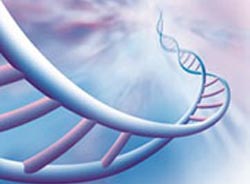
The polymerase chain reaction (PCR) is a technique for quickly "cloning" a particular piece of DNA in the test tube (rather than in living cells like
E. coli). Thanks to this procedure, one can make virtually unlimited copies of a single DNA molecule even though it is initially present in a mixture containing many different DNA molecules
In cooperation with collaborators from Shanghai Jiao Tong University, CAS scientists have come up with a novel approach to improve the specificity of PCR. Their work has been published recently online by
Angew. Chem. Int. Ed, a world-renowned German journal of applied chemistry.
Having revolutionized molecular genetics, PCR has become one of the most popular techniques in modern biological and medical sciences. Owing to PCR's exponential amplification ability, one could start from even a single copy of target DNA to produce a large amount of DNA copies for sequencing, molecular diagnosis, or genetic analysis. This remarkable amplification ability is critical in many circumstances, such as early-stage diagnosis of HIV or cancers. Given the rapidly increasing interest in optoelectronic DNA biosensors, the extremely high detection sensitivity of PCR has not been surpassed until now. However, the specificity of PCR does not match its unparalleled sensitivity. It is well known that even with sophisticated optimization, PCR specificity is not always satisfactory.
With the support from CAS and some other governmental departments, a research team headed by Fan Chunhai and Hu Jun from the CAS Shanghai Institute of Applied Physics and Zhang Zhizhou from the Bio-X Life Science Research Center, Shanghai Jiao Tong University, developed a novel PCR method that employs inexpensive gold nanoparticles to effectively avoid nonspecific PCR reactions.
This highly selective strategy shows that, as reported by the Shanghai team, in the presence of appropriate concentrations of gold nanoparticles, PCR amplification can be optimized both in terms of yields and specificity. Therefore it opens new opportunities for improving PCR by employing very stable, commercially available, and inexpensive inorganic nanomaterials.
Furthermore, the team suggests that the gold nanoparticles may also be applied to various PCR reactions that require either high specificity or high yields, such as single-molecular, multiplex, and long-distance PCRs.
The new technology not only links PCR with the gold nanoparticles but also opens a new horizon in the development of nano-biotechnology through furtherance of the widely applicable method of PCR, says a reviewer of the Angew. Chem. Int. Ed. As the classic bio-chemical reaction of PCR can remarkably raise its own efficiency, an application "bottleneck" of the most important standard method in molecular biology is somewhat solved.





